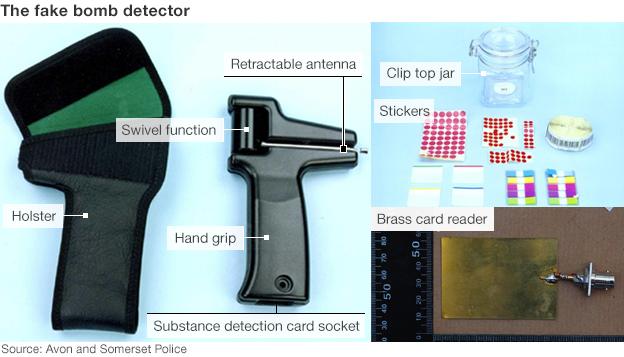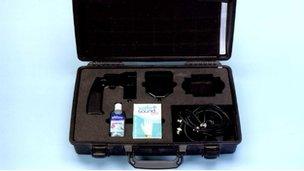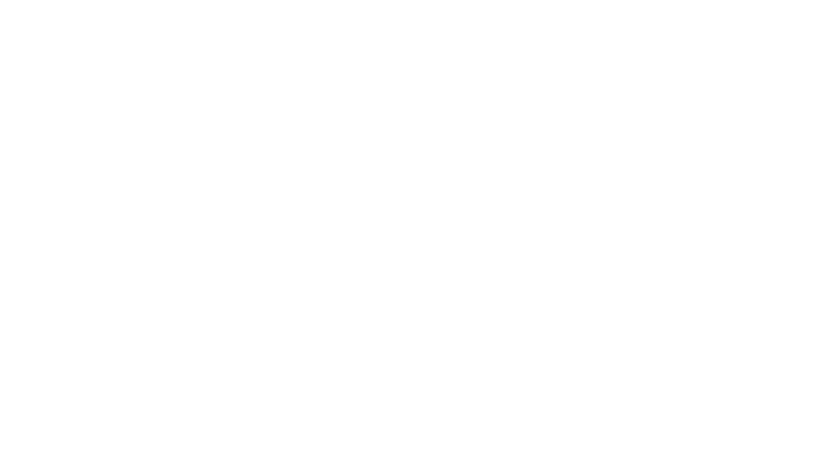Fake bomb detectors 'destroyed lives'
- Published
The "bomb detectors" were actually just radio aerials attached by a hinge to a handle.
A Somerset-based businessman has been convicted of three counts of fraud over the sale of bogus bomb detectors after his operation was exposed in a BBC Newsnight investigation in 2010.
This was a scam of global dimensions. James McCormick marketed his fake bomb detectors around the world, selling them in Georgia, Romania, Niger, Thailand, Saudi Arabia and beyond.
But his main market was Iraq, where lives depended on bomb detection and where the bogus devices were, and still are, used at virtually every checkpoint in the capital.
Between 2008 and 2009 alone, more than 1,000 Iraqis were killed in explosions in Baghdad. Thousands more were injured, including 21-year-old Haneen Alwan, who was two months pregnant and had gone out to buy ice cream when she was caught in a bomb in January 2009.
"My life was completely destroyed, everything gone in an instant," she said. "I lost the baby and my husband divorced me."
Whistleblower
Haneen, who is receiving treatment in neighbouring Jordan, suffered horrific burns to her face, hands and chest and has already had 59 operations. She blames the bombers but she also blames Jim McCormick.
"When people passed through checkpoints using these devices, they thought they would be safe," she told the BBC. "But they are useless. The man who sold them has no conscience. He is morally bankrupt. How could he sell them just for money and destroy other people's lives?"


How the device was meant to work:
1. A small amount of the substance the user wished to detect - such as explosives - was put in a Kilner jar along with a sticker that was intended to absorb the "vapours" of the substance
2. The sticker was then placed on a credit-card sized card, which was read by a card reader and inserted into the device
3. The user would then hold the device, which had no working electronics, and the swivelling antenna was meant to indicate the location of the sought substance

An answer to that question comes from a whistleblower who has spoken exclusively to the BBC's Newsnight programme. He went around the world with McCormick as he sold the devices, but then became suspicious and confronted him.
"I said to him, 'if this really doesn't work I can't be any part of it.' McCormick replied 'It does exactly what it's designed to. It makes money'," he said.
The court heard that McCormick began his business by buying a batch of novelty "golf ball detectors" from the USA for less than $20 each. In fact they were simply radio aerials, attached by a hinge to a handle. He put the labels of his company, ATSC, on them and sold them as bomb detectors for $5,000 each.
He then made a more advanced-looking version which he was to sell for up to $55,000. The ADE-651 came with cards which he claimed were "programmed" to detect everything from explosives to ivory and even $100 bills. Police say the only genuine part of the kit - and the most expensive - was the carrying case.
Corruption
Iraq spent $85m on the devices, much of which went in bribes to senior figures, including the head of the Baghdad bomb squad, General Jihad al-Jabiri. He and two other Iraqi officials are now serving jail terms for corruption.

Police said the only genuine piece of the kit was its case
But the Inspector General of the Iraqi interior ministry, Aqil al-Turehi, who is conducting an investigation backed by the country's prime minister, believes that other, more senior, Iraqis were also involved in the deals which he angrily describes as a "conspiracy".
"I feel furious when I think that this gang of Jim McCormick and the Iraqis working with him killed my people by creating false security and selling such a useless device," he said.
Mr Al-Turehi believes the scam is responsible for hundreds of deaths. He provided evidence to the court that one vehicle laden with rockets and missiles passed through 23 checkpoints using the device, undetected. "The terrorists were able to gloat over the fact that it didn't work," he told the BBC.
Yacht
McCormick's former colleague says that the bribes were paid through a bank in Beirut, where accounts were set up in false names. Our source believes at least 15 Iraqi officials were on the payroll.
He says he walked out on McCormick in 2008, telling him: "I want nothing more to do with it" and that McCormick replied: "Suit yourself. You're walking away from millions."
The whistleblower then contacted ATSC's customers and the Ministry of Defence to alert them that the ADE651 was a scam. He, and other campaigners against the device, are angry that more was not done earlier to close down McCormick's operation. "Lives could have been saved," he said.
Avon and Somerset Police, which began investigating Jim McCormick in 2009, are trying to track down the millions which he amassed through the sales.
He has an expensive country home in Somerset, with three dressage horses, as well as houses in Florida and Cyprus, and a yacht. He also bought film star Nicolas Cage's mansion in Bath - complete with basement swimming pool.
But, convicted now of such a serious fraud, he is expected to spend the next few years in a jail cell.
- Published23 April 2013
